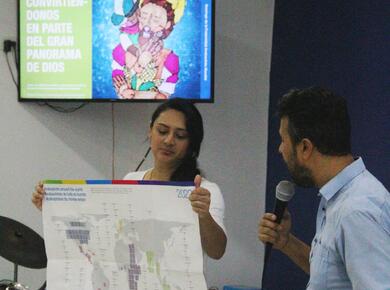Posted: April 17, 2024
“…Making every effort to maintain the unity of the Spirit in the bond of peace” (Ephesians 4:3).
A global fellowship, 109 national churches, 58 countries, some 10 000 congregations, 1.4 million members, 45 languages: can that ever be unified?
The church is often called the body of Christ. A physical body needs different organs to function. And so it is with the church: you need diversity to function, to be a whole entity.
So it is also in the world communion. Depending on their place in the world, depending on their context, MWC member churches are different. So they can support each other and learn from each other.
Being a faith community in the Netherlands is very different from being in Indonesia or in Myanmar. Living as a very small minority in a country where another religion is by far the majority or in a country torn by violence of civil war is different from living in a country where there has been no war for more than 70 years and where there is freedom of religion.
Old communities have different challenges than new ones, and in that too we can learn from each other and encourage each other.
This unity in diversity is very vulnerable. Too easily we protest that the other does not belong to us because they do not live the faith exactly as we do or because they read the Bible differently than we do.
But Scripture says that unity is given by the Spirit: who are we to break it?
So you have to make an effort, to look for connection rather than separation. And we must have courage to endure one another even when we disagree. For it is the “mortar” of one God and one Spirit that binds together our disparate pieces into a picture of beautiful diversity.
This is how we came to set out the 7 shared convictions of Mennonite World Conference. It took 13 years to get those formulated and approved by consensus in the General Council. Among other things, we wrote down the values we share about God, the Bible, Jesus, peace witness and about worship.
If that sense of connection based on convictions is our basis, then we can talk about the differences. We can approach each other without judging, but instead with interest in what concerns the other.
And if we are brave enough to hold that, we can make a beautiful mosaic, showing the world that we can reach across human borders of nationality, colour, language and more to live in peace with each other.
—Henk Stenvers is president of Mennonite World conference (2022-2028). He delivered this address on Anabaptist World Fellowship Sunday to his local congregation of Doopsgezinde Gemeente Bussum-Naarden, in the Netherlands.
Click here to watch the service on YouTube (in Dutch).


Join the Conversation on Social Media
FacebookTwitterInstagramFlickrYouTube